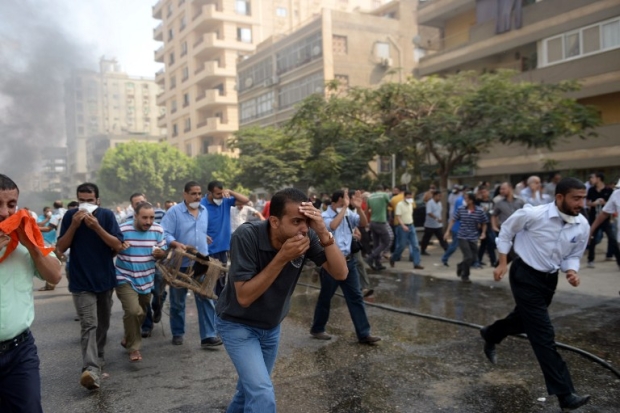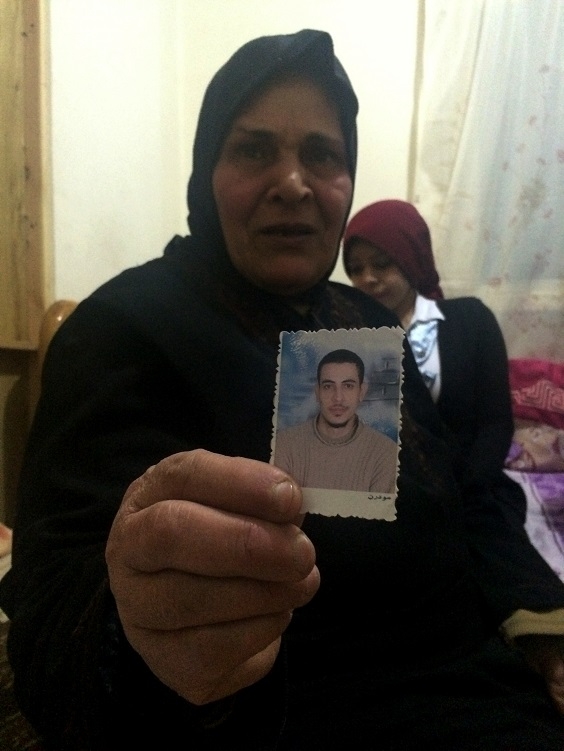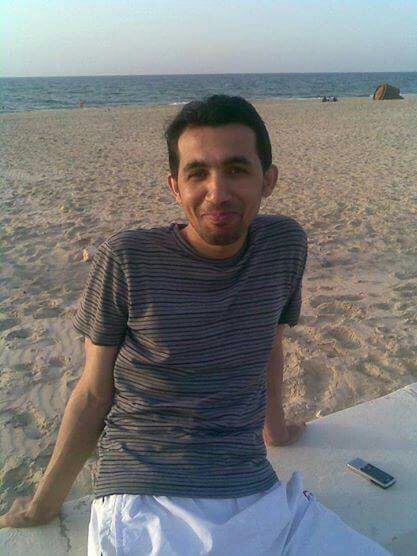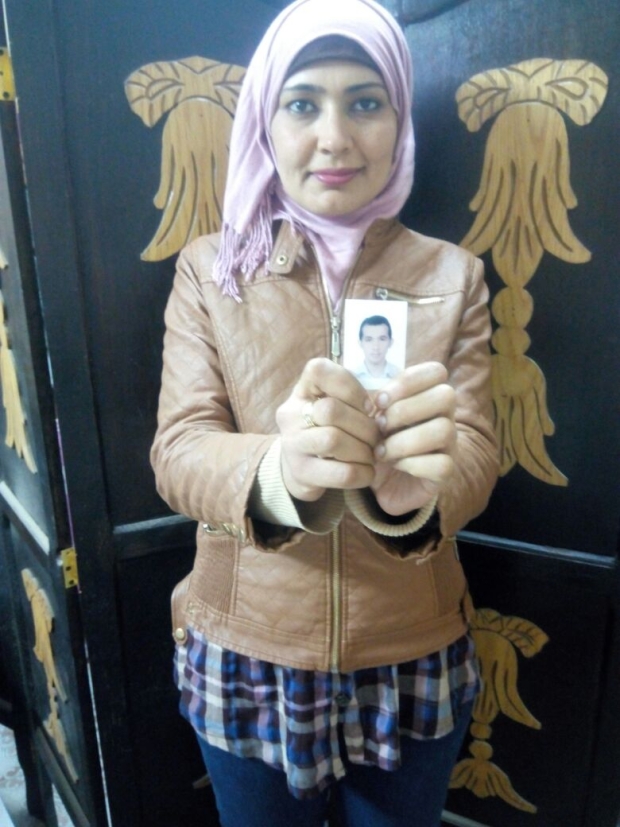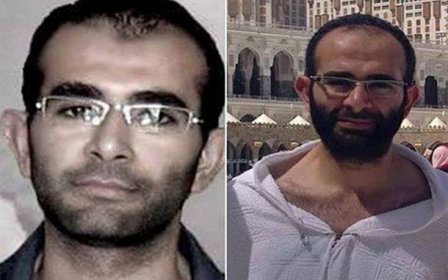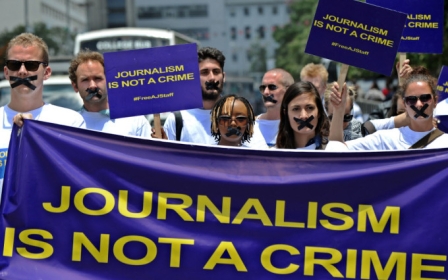Unlucky bystanders on trial: Rabaa prisoners yearn for freedom
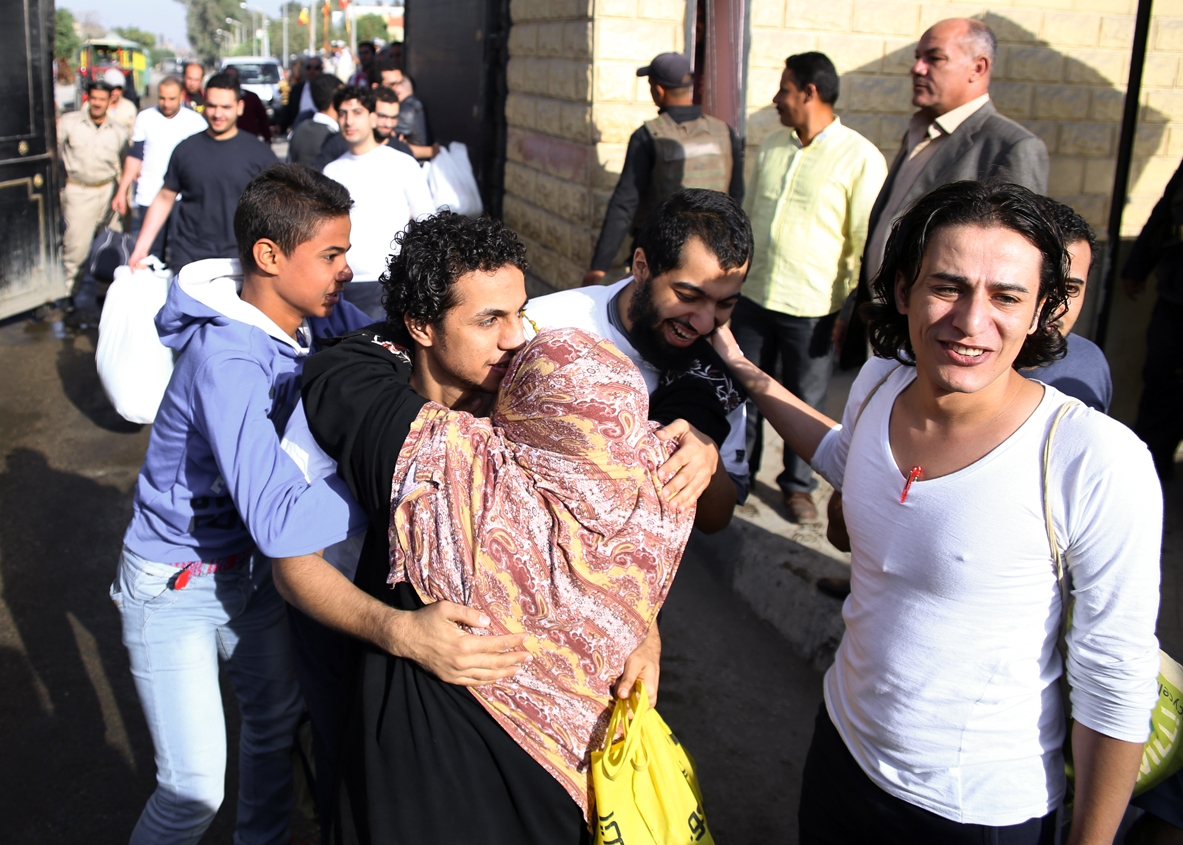
Diaa Ahmed, 33, has been held in Egyptian prisons for more than 1,200 days. He faces a possible death penalty, all because, he says, he was in the wrong place at the wrong time.
His ordeal began when he was arrested on 14 August 2013 near Rabaa al-Adawiya Square, where hundreds of demonstrators were killed as security forces cracked down on protesters supporting deposed president Mohamed Morsi.
"I lost hope. I feel stranded in an endless deep black hole, my life has stopped and I don't know how to get out of here," Ahmed said from prison.
‘I lost hope. I feel stranded in an endless deep black hole’ - Diaa Ahmed, prisoner
Middle East Eye exchanged interviews with Ahmed and two other prisoners through their families, who visit them on a weekly basis.
On that day more than 1000 demonstrators were killed as security forces cleared Rabaa square of protesters supporting deposed president Mohamed Morsi, the first elected civilian president of Egypt and a high-ranking member of the Muslim Brotherhood.
The bloodshed that occurred that day has been described as the “worst single-day killing of protesters in modern history". Hundreds of protesters were arrested, and other innocent bystanders were also detained during the turmoil and have been locked up in prison ever since.
Ahmed and nine other detainees stress that they "have no single relation" with Morsi or the Muslim Brotherhood.
"I'm not an Islamist at all, I even hate the Brotherhood," said Ahmed.
Ahmed, who used to promote books and write book reviews before his arrest, said that he was visiting a travel agency in the area on that day to help him prepare the paperwork to start a new life in Australia.
"I got stranded between the security forces and the protesters. I feared that if I ran from the security forces, they would consider me a fleeing protester,” he said.
'I got stranded between the security forces and the protesters' - Diaa Ahmed, prisoner
Military forces eventually searched the building and found Ahmed hiding in one of the rooms, where he was arrested.
He is now on trial with 738 other defendants in a case known as the "dispersal of Rabaa sit-in". Charges against them included murder, attempted murder, rioting, possession of arms and vandalising public property.
The trial started two years after their arrest in December 2015, but was postponed until February 2017 to expand the dock, so it could take the large number of defendants, all of whom are required to attend their trial, according to Egyptian law.
Ahmed was initially held in Abu Zaabal prison with little access to clean water and food. For one month, his family knew nothing about his whereabouts. He was then moved to Torrah prison south of Cairo, where he is now being held.
"My family tried everything to prove that I'm not related to the Muslim Brotherhood but all their efforts were in vain,” he said.
His family asked Ahmed’s friends and neighbours to give testimonies regarding his political views and affiliations and requested that the National Security Agency investigate his background.
‘At the beginning, I was sure it was only a matter of time and we would be released, but then I began to lose any glimpse of hope’ - Diaa Ahmed, prisoner
"At the beginning, I was sure it was only a matter of time and we would be released, but then I began to lose any glimpse of hope,” he said.
"When the prison visit ends, I feel like they take my soul out of my body,” Ahmed's mother, 60-year-old Nefisaa Abdel Shay, said while sitting on Ahmed’s bed.
The family visits Ahmed in prison every Thursday and bring him his favourite food, kofta (minced meat seasoned with Middle Eastern herbs) and liver.
"I swear he didn't do anything wrong, he barely prays so how could they say that he is a member of the Muslim Brotherhood?" said the mother of five.
"We pay the price for being poor without anyone to back us. He is losing his life,” she added.
"It's very painful to be incapable of helping your son, to stand there without being able to do anything to save him," he said, while wiping his tears.
"All I need before my death is to see Diaa in this house even for one night," said his mother.
Joint letter
In April 2016, the 10 prisoners wrote a joint letter begging the court to release them, saying that national security officers told them repeatedly that investigations proved that they have no links with any “group" or "extremist beliefs”.
"970 days of slow death is enough," the prisoners wrote in the letter, "We are being buried alive and paying the price for a battle we have no stakes in." But their detention was extended again in June 2016.
'We are being buried alive and paying the price for a battle we have no stakes in' – prisoners' letter
They wrote another letter to the court afterwards, warning that they are thinking about committing suicide.
"I think it's normal to think of ending our lives. We are not really living out here," said computer programmer Mohamed Abdo, justifying the letter he wrote with the other prisoners.
Twenty-seven-year-old Abdo shares a cramped, narrow cell, three metres wide and four metres long, with 12 other prisoners.
He finished his compulsory military service in February 2013 and was on his way back from work when angry demonstrators cut off Mostafa al-Nahas street near the Rabaa sit-in and stopped his bus at 8:30am. He said he was caught in the middle of the violence and military forces randomly arrested everyone they could in the area.
"I worked for six months only and then life suddenly darkened,” he said.
Abdo who loves his work desperately added: "I only dream of the touch of the keyboard even without a screen."
Ahmed Abdel-Latif, the lawyer representing the defendants from the Arabic Network for Human Rights Information (ANHRI), said that the "charges are baseless with no single piece of evidence against any of them".
"Even if they are acquitted, who will pay for at least the three and a half years they have spent in prison?" he said. "No one.”
'Who will pay for at least the three and a half years they have spent in prison?' – Ahmed Abdel-Latif, lawyer
An official from the prosecution, who asked to remain anonymous because he was not permitted to speak to the media, told MEE that the he cannot comment on a case that’s being reviewed by court.
Baseless charges
Since the army deposed Morsi on 3 July 2013, more than 40,000 people have been detained, while hundreds of his supporters have been sentenced to death in swift mass trials which the United Nations say were "unprecedented" in recent history.
On the eve of 13 August 2013, 35-year-old salesman Ahmed Ali went with his fiancee Sara to a cinema in City Stars shopping mall about five kilometres away from the pro-Morsi protest camp in Rabaa Square.
Finishing late and having to travel early at 7am to visit his family in al-Arish, Ali decided to wait at a cafe near Teba mall a few metres from Rabaa Square and have a cold drink, until it was time to catch a microbus to al-Arish.
At 6am, when the sound of firing began, he said that he ran away, but a police officer stopped him in a street close to Teba mall to check his ID.
He was arrested soon after the officer found out he was from North Sinai, where many Bedouins are accused of supporting the Muslim Brotherhood and militant groups against the government.
"It only took a second but now it has lasted for 1,265 days," he said, adding that he now counts the time he spent in prison in days not months.
Ali, who used to be a very optimistic sales person in a textile company, now shares the same prison cell with Ahmed.
"I feel forgotten and oppressed. Everything around us here makes me feel that humanity and law are meaningless. Life has stopped since my arrest."
Ali said that five of his sisters got married while he was in prison and he missed the chance to stand beside them on one of the most important days of their life.
"All what I want is to smell fresh air and have the freedom to open the door with my will not others."
'All what I want is to smell fresh air and have the freedom to open the door with my will not others' – Ahmed Ali, prisoner
Yet, the love and support of his fiancée keeps him strong and patient.
Though their engagement party was held only four days before his arrest, his fiancée Sara Zaki, 30, pledged to stand by his side.
"I'm with him under any circumstances. Ahmed is all my life and it's impossible to let him go,” Zaki said. "Many advised me not to waste my time with a guy with an unknown future, but I'm determined to stay by the side of the only man I have ever loved."
Her support has given Ali some hope in the future.
"The first thing I will do when I get released is see my mother and fiancée at the same time, and then get married," he said.
“I choose hope over desperation and there is always hope," he concluded.
Middle East Eye propose une couverture et une analyse indépendantes et incomparables du Moyen-Orient, de l’Afrique du Nord et d’autres régions du monde. Pour en savoir plus sur la reprise de ce contenu et les frais qui s’appliquent, veuillez remplir ce formulaire [en anglais]. Pour en savoir plus sur MEE, cliquez ici [en anglais].


